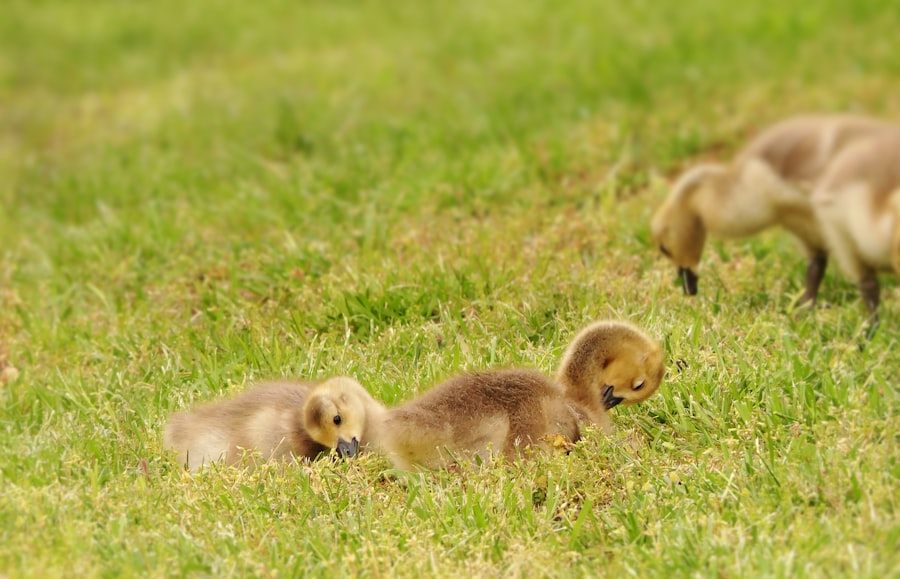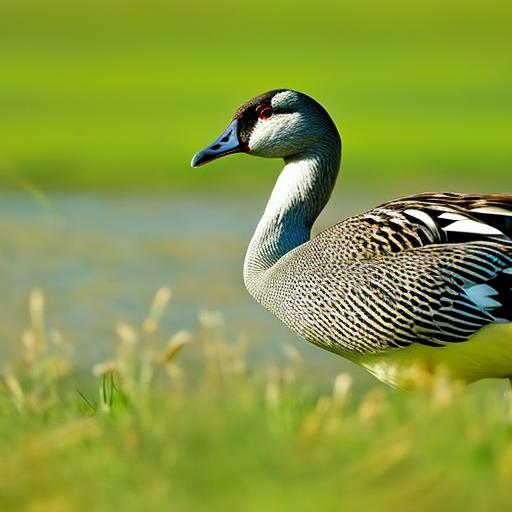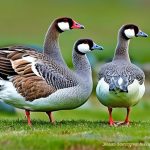Geese are social birds that often travel in flocks and are known for their strong family bonds. They are herbivores and primarily feed on grass, aquatic plants, and grains. Geese are also known to be territorial and can become aggressive when they feel threatened or when protecting their nests and young. Understanding the behavior of geese is crucial in finding effective ways to deter them from eating the grass on your property. By understanding their feeding habits, territorial nature, and social behavior, you can implement strategies that will discourage geese from making your property their feeding ground.
Geese are also known for their strong homing instincts, which means that once they have found a suitable feeding area, they are likely to return to it regularly. This makes it important to address the issue of geese feeding on your grass promptly and effectively. By understanding the behavior of geese, you can develop a comprehensive plan to deter them from eating the grass on your property and prevent them from returning in the future.
Key Takeaways
- Geese are attracted to grassy areas for feeding and nesting, and their behavior can be influenced by various deterrent methods.
- Physical barriers such as fences, netting, and hedges can effectively prevent geese from accessing grassy areas.
- Natural deterrents like planting certain types of grass, using repellent sprays, and introducing predator decoys can discourage geese from eating the grass.
- Creating an alternative feeding area with suitable food sources can redirect geese away from the grassy area.
- Noise and visual deterrents such as scarecrows, reflective tape, and ultrasonic devices can help keep geese away from the grass.
- Regular maintenance routines like removing droppings, trimming grass, and eliminating standing water can deter geese from returning to the area.
- If geese continue to be a problem, seeking professional help from wildlife management experts can provide effective long-term solutions.
Implementing physical barriers to prevent geese from accessing the grass
One effective way to prevent geese from accessing the grass on your property is by implementing physical barriers. This can include installing fences, hedges, or other structures that create a physical barrier between the geese and the grass. Fences can be particularly effective in deterring geese, as they create a clear boundary that the birds are less likely to cross. It is important to ensure that any physical barriers are tall enough to prevent the geese from flying over them or reaching the grass from the other side.
Another option is to use netting or other materials to cover the grass and prevent the geese from accessing it. This can be particularly effective in areas where geese are a persistent problem and other deterrent methods have not been successful. By implementing physical barriers, you can effectively prevent geese from accessing the grass on your property and encourage them to find alternative feeding areas.
Using natural deterrents to discourage geese from eating the grass
In addition to physical barriers, natural deterrents can also be effective in discouraging geese from eating the grass on your property. One natural deterrent is the use of plants that are unappealing to geese, such as tall grasses or shrubs with thorns. These plants can create an uninviting environment for geese and discourage them from feeding on the grass.
Another natural deterrent is the use of predator decoys, such as fake owls or coyotes, which can create the illusion of danger and discourage geese from approaching the area. Additionally, planting aromatic herbs or flowers that are unappealing to geese, such as lavender or mint, can also help deter them from feeding on the grass.
By using natural deterrents, you can create an environment that is unappealing to geese and discourage them from eating the grass on your property.
Creating an alternative feeding area for the geese
One effective way to deter geese from eating the grass on your property is by providing them with an alternative feeding area. This can be done by creating a designated feeding area for the geese that is away from the grass you want to protect. This can be achieved by planting a separate area with grasses or grains that are more appealing to geese, or by providing them with food such as cracked corn or birdseed in a designated feeding area.
By providing geese with an alternative feeding area, you can redirect their attention away from the grass on your property and encourage them to feed in a more suitable location. This can help reduce the damage caused by geese feeding on your grass and minimize the need for more aggressive deterrent methods.
Utilizing noise and visual deterrents to keep geese away from the grass
Noise and visual deterrents can also be effective in keeping geese away from the grass on your property. One option is to use noise-making devices, such as propane cannons or electronic sound machines, to create loud noises that will scare away the geese. These devices can be set to go off at regular intervals to create a consistent deterrent effect.
Visual deterrents, such as reflective tape or scarecrows, can also be effective in deterring geese from feeding on the grass. These visual deterrents create a sense of danger and make the area less inviting for geese, encouraging them to find alternative feeding areas.
By utilizing noise and visual deterrents, you can create an environment that is unappealing to geese and discourage them from eating the grass on your property.
Establishing a regular maintenance routine to deter geese from returning

Establishing a regular maintenance routine can also help deter geese from returning to feed on the grass on your property. This can include regularly mowing the grass to keep it short, which makes it less appealing to geese as a feeding ground. It is also important to remove any spilled birdseed or other food sources that may attract geese to the area.
In addition, maintaining a clean and tidy property can help deter geese from returning, as they are less likely to find suitable nesting sites or feel safe in an area that is well-maintained. By establishing a regular maintenance routine, you can create an environment that is less inviting to geese and discourage them from returning to feed on the grass.
Seeking professional help if geese continue to be a problem
If despite your best efforts, geese continue to be a problem and persist in feeding on the grass on your property, it may be necessary to seek professional help. There are companies that specialize in wildlife management and can provide effective solutions for deterring geese from your property.
Professional wildlife management companies may offer services such as habitat modification, hazing techniques, or population control methods that can effectively deter geese from feeding on your grass. These companies have the expertise and resources to develop comprehensive plans for deterring geese and preventing them from returning in the future.
In conclusion, understanding the behavior of geese is crucial in finding effective ways to deter them from eating the grass on your property. By implementing physical barriers, natural deterrents, creating alternative feeding areas, utilizing noise and visual deterrents, establishing a regular maintenance routine, and seeking professional help if necessary, you can effectively deter geese from feeding on your grass and prevent them from returning in the future.
If you’re struggling with geese eating your grass, you might also be interested in learning about the mating season for turkeys. Understanding the breeding behaviors of turkeys can provide valuable insights into managing poultry and maintaining your outdoor space. Check out this informative article on mating season for turkeys to expand your knowledge of poultry care and management.
FAQs
What are some effective methods for keeping geese from eating your grass?
Some effective methods for keeping geese from eating your grass include using physical barriers such as fences or netting, using repellents such as decoys or reflective tape, and modifying the landscape to make it less attractive to geese.
Are there any natural deterrents that can be used to keep geese away from grass?
Yes, there are natural deterrents that can be used to keep geese away from grass. These include planting tall grasses or shrubs around the perimeter of the grassy area, using natural predators such as dogs or hawks, and creating water features that are unattractive to geese.
What are some non-lethal methods for controlling geese and protecting grassy areas?
Non-lethal methods for controlling geese and protecting grassy areas include using noise deterrents such as propane cannons or sonic devices, using visual deterrents such as scarecrows or balloons, and using habitat modification techniques such as adding vegetation or altering the landscape to make it less appealing to geese.
Are there any regulations or laws regarding the control of geese in residential areas?
Regulations and laws regarding the control of geese in residential areas vary by location. It is important to check with local authorities or wildlife agencies to determine the specific regulations and laws that apply to controlling geese in your area.
What are some long-term solutions for keeping geese from eating grass?
Some long-term solutions for keeping geese from eating grass include implementing habitat modification techniques to make the area less attractive to geese, using a combination of deterrent methods to create a comprehensive control strategy, and consistently monitoring and maintaining the grassy area to prevent geese from returning.
Meet Walter, the feathered-friend fanatic of Florida! Nestled in the sunshine state, Walter struts through life with his feathered companions, clucking his way to happiness. With a coop that’s fancier than a five-star hotel, he’s the Don Juan of the chicken world. When he’s not teaching his hens to do the cha-cha, you’ll find him in a heated debate with his prized rooster, Sir Clucks-a-Lot. Walter’s poultry passion is no yolk; he’s the sunny-side-up guy you never knew you needed in your flock of friends!







